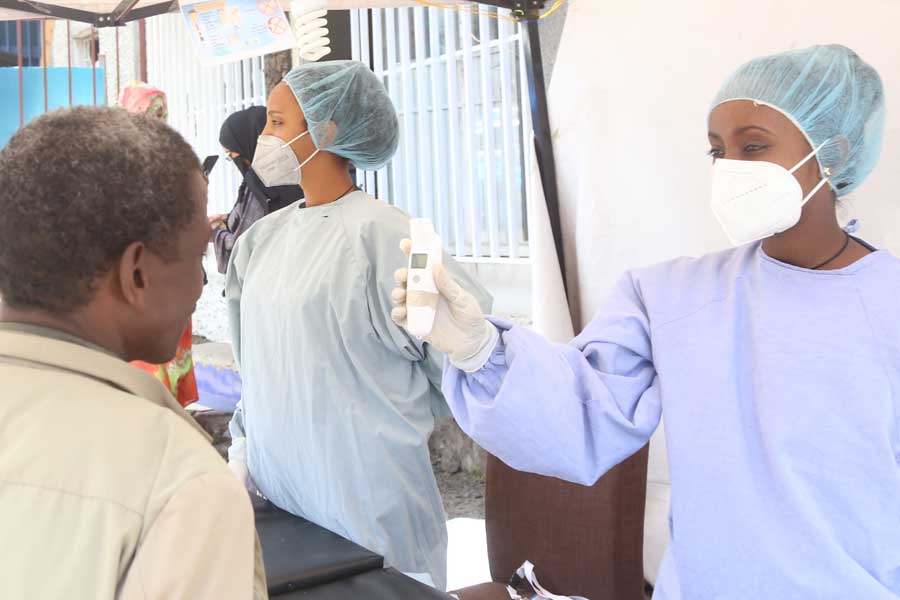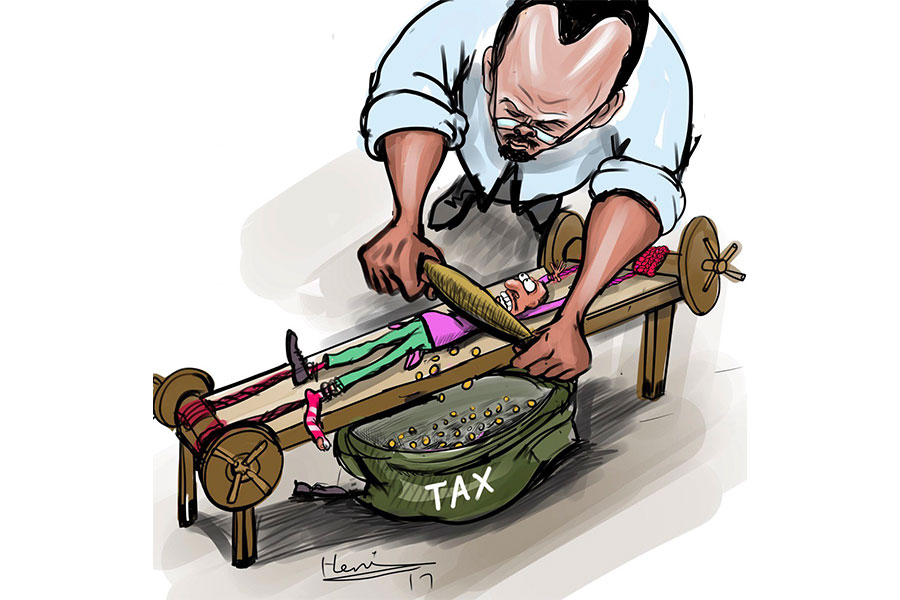
Fortune News | Aug 29,2020
On the late afternoon of Tuesday, February 4, 2020, over a hundred people milled about inside Addis Abeba Bole International Airport waiting for family, friends or relatives returning from abroad.
Some were restless from the long wait, while others welcomed their loved ones who arrived at the terminal with hugs that revealed how much they missed each other.
Nothing was out of place, in fact, except for a few individuals wearing face masks in the waiting area.
Abdu Juhar was among those sporting a face mask to cover his nose and mouth. He was also repeatedly cleaning his hands with a liquid hand sanitizer.
Abdu, in his late 20s, has spent the last two years in China at Guilin University of Electronic Technology (GUET) to study mechanical engineering.
He was very exhausted after traveling for close to 11 hours but was glad to be back, because he was afraid of contracting the Novel Coronavirus (2019-nCoV), a virus that only recently was named but has since spread from China across the globe.
The virus became the latest and hottest global issue after it infected 31,526 people in 25 countries killing over 638 and spreading fast. Out of the 31,237 confirmed cases in China, 4,821 are reported to be severe cases as of February 7, 2020.
Patients infected with the virus have symptoms of fever, cough and being out of breath.
Avoiding close contact with people suffering from acute respiratory infections, washing hands with soap and water for at least 20 seconds, and avoiding touching the eyes, nose and mouth with unwashed hands are some of the preventive measures to halt the spread of the respiratory virus.
First reported in Wuhan, China, on December 31, 2019, the virus is spreading fast and made Botswana its first African destination.
Coronavirus is one of a large family of viruses that cause illnesses ranging from the common cold to more severe diseases. The current Novel Coronavirus is the third kind to surface globally.
Middle East Respiratory Syndrome (MERS-CoV) in 2012 in Saudi Arabia and Severe Acute Respiratory Syndrome (SARS-CoV) in Asia in February 2003 were the two strains of the virus that had previously been identified. The current Novel Coronavirus is a new viral strain that has not been previously identified in humans.
Abdu Juhar
A total of 2,494 laboratory-confirmed cases of Middle East Respiratory Syndrome (MERS), including 858 associated deaths, were reported globally. The majority of these cases were reported in Saudi Arabia, which had 2,102 cases with 780 related deaths.
Afraid of its severity, many countries and airlines have started banning travel to China. Air Canada, American Airlines, British Airways, Delta, Lufthansa, Emirates, Etihad Airways and Qatar Airways have already suspended all flights to and from mainland China until the end of February or longer. But not Ethiopian Airlines.
"The situation in China is hard," said Abdu. "There're no major activities in cities."
Due to the fast-spreading nature of the virus, people who are travelling from and into the country through Addis Abeba Bole International Airport have been wearing face masks to protect themselves from the virus.
Feleke Abebaw, a father of one and an employee of the Immigration, Nationality & Vital Event Agency, has been wearing a face mask for the past two weeks.
Since he has direct contact with passengers coming into the country after they go through the screening test, Feleke became cautious and started to wear a mask to protect himself.
"There are close to 40 flights to and from China in a week," Feleke said. "We have to be more serious."
The World Health Organisation (WHO) in its latest report also confirmed that Ethiopia is one of the 13 high-risk African countries for coronavirus.
Alerted to the fast spread of the virus, the Ethiopian Public Health Institute (EPHI) has deployed 200 medical staff that conduct tests on passengers, especially those who arrived from China at the airport since January 23, 2020.
Along with the airport, the Institute is carrying out the screening on 27 border stations as well. It is also screening passengers at Dire Dawa International Airport and Dewele border crossing starting from the middle of last week.
A rapid response team established by the Institute that consists of five to six members is working 24 hours a day in three shifts. Four vehicles and two ambulances are designated to transport suspected people to health centres including St. Paulos, Bole Cheffe and Kotebe hospitals.
All passengers arriving at Bole International Airport will go through body temperature screening, which mainly identifies passengers who have a high fever.
So far, 14 people have been quarantined, since they were suspected of having the virus.
The team is holding passengers who come from Wuhan, China until they are cleared.
So far, 14 people have been quarantined, since they were suspected of having the virus. Out of these, one is a Chinese national, while the remaining are Ethiopians who flew in from China.
Eight samples from the suspects have been sent to South Africa to be tested, and the results have returned negative. Three more samples are currently being tested, and the other three will be sent shortly.
It takes up to five days for the result of the samples to be returned from South Africa, according to Feyisa Regassa (MD), the international health regulation national focal person at the Institute, which is getting funds from the government and the international partners including WHO due to the international nature of the crisis.
Tedros Adhanom (MD), director-general of WHO, expressed his concern by stating that there are countries that do not have a system in place to detect people who have contracted the virus.
"To prevent further human-to-human transmission and protect health workers," said Tedros, "urgent support is needed to bolster weak health systems to detect, diagnose and care for people with the virus."
The Institute, in collaboration with WHO and African Centers for Disease Control & Prevention (CDC), is importing medical equipment to start testing samples in-country, according to Feyisa.
"The equipment will allow us to test the existence of Coronavirus locally," he said. "We'll begin testing in a week."
In the case of an outbreak, the Institute has established a national emergency centre at Ethiopian Airlines, St. Paul and Kotebe hospitals to keep suspected patients in isolation.
If a Coronavirus case is confirmed in Ethiopia, close to one billion Birr is needed to take preventive measures, according to sources from the Institute. The value is almost one thirteenth of the federal budget allocated to the health sector.
As a preparation, if a Coronavirus case is confirmed in Ethiopia, the Institute began giving training to medical personnel on screening management, infection control and personal protection, according to Feyisa.
Regardless of the WHO's warning and the fear of the people, Ethiopian Airlines announced that it will continue flying to China.
"We're going ahead with our regular flights to all of our five gateways in China: Beijing, Shanghai, Guangzhou, Chengdu and Hong Kong," announced the Airlines on January 30, 2020. "We're working ... to protect our passengers and our crew from coronavirus."
The Ministry of Health has also formed a task force, which consists of members from the Ministry and the Ministry of Foreign Affairs and is led by Lia Tadesse (MD), state minister for Health.
"The quarantine centres are equipped with materials including beds and oxygen," said Yordanos Alebachew, deputy communications director at the Ministry of Health.
The Institute also dispersed 3,000 N95 masks, safety devices that cover the nose and mouth, which protect the wearer from breathing in some hazardous substances. It also distributed 300 personal protection devices to the regional states.
In addition to those who wear a mask at the Airport, many residents of the city, including cab drivers and employees working at Chinese companies, wear these masks.
Due to the incident, the demand for these masks has also increased significantly, according to pharmacists in the capital.
"Previously, our customers bought face masks only for work-related purposes," said Konjit Alemayehu, a pharmacist at Stadium Pharmacy, "but now random people began using the masks to protect themselves from the virus."
Before the outbreak of Coronavirus, Stadium Pharmacy was selling one face mask a day on average, but now it sells up to 30 masks a day for 10 Br each.
The current prevention activity by the Institute should continue especially at the Airport, according to Tamrat Abebe (MD), assistant professor at Addis Abeba University's School of Medicine.
The virus will take 14 days of incubation period from exposure to the developing symptoms, according to Tamrat.
“If the airline is taking such kinds of precautions to prevent the virus from coming into the country," he said, "there should be no worries."
However, another expert from Addis Abeba University argues that Ethiopian Airlines should halt its flights to China.
Abdu, who has passed the test at the Airport, loaded his four bags into a taxi to get to his house. Even though he feels a bit more comfortable reaching home, he is still concerned about his friends who remain in China.
PUBLISHED ON
Feb 08,2020 [ VOL
20 , NO
1032]

Fortune News | Aug 29,2020

Radar | Aug 21,2021

Fortune News | Apr 12,2020

Radar | Jul 06,2019

My Opinion | Jan 31,2021

International Stories | Apr 07,2020

Radar | Jul 18,2020

Radar | May 31,2025

Radar | Jan 29,2022

Radar | Aug 12,2023

Dec 22 , 2024 . By TIZITA SHEWAFERAW
Charged with transforming colossal state-owned enterprises into modern and competitiv...

Aug 18 , 2024 . By AKSAH ITALO
Although predictable Yonas Zerihun's job in the ride-hailing service is not immune to...

Jul 28 , 2024 . By TIZITA SHEWAFERAW
Unhabitual, perhaps too many, Samuel Gebreyohannes, 38, used to occasionally enjoy a couple of beers at breakfast. However, he recently swit...

Jul 13 , 2024 . By AKSAH ITALO
Investors who rely on tractors, trucks, and field vehicles for commuting, transporting commodities, and f...

Jul 19 , 2025
Parliament is no stranger to frantic bursts of productivity. Even so, the vote last w...

Jul 12 , 2025
Political leaders and their policy advisors often promise great leaps forward, yet th...

Jul 5 , 2025
Six years ago, Ethiopia was the darling of international liberal commentators. A year...

Jun 28 , 2025
Meseret Damtie, the assertive auditor general, has never been shy about naming names...